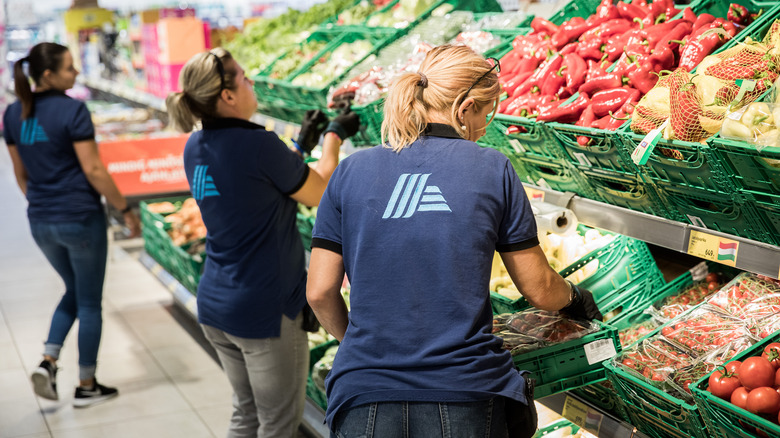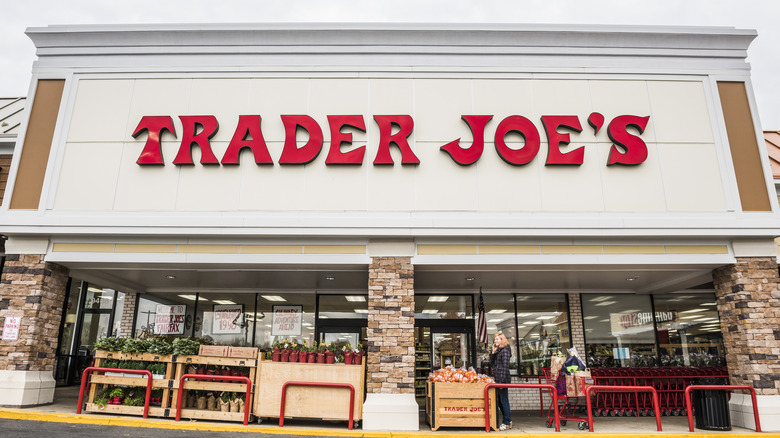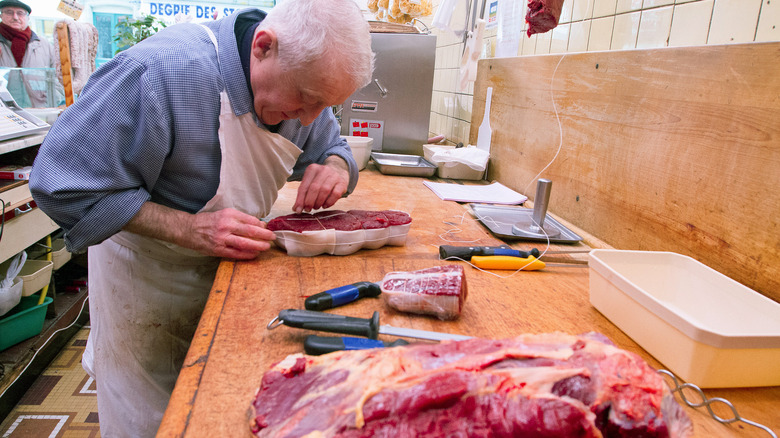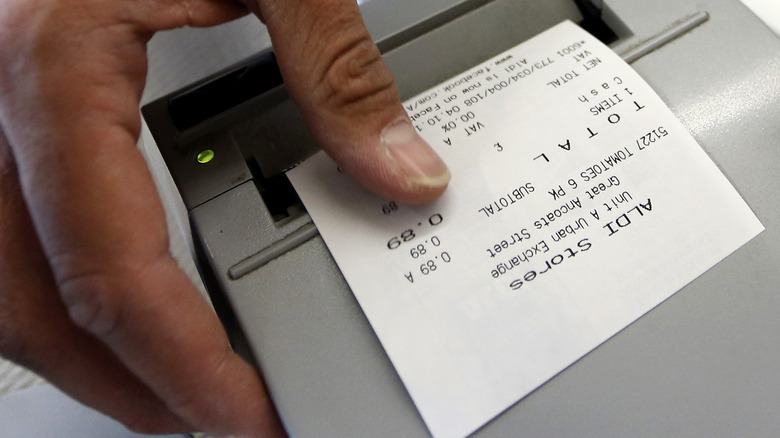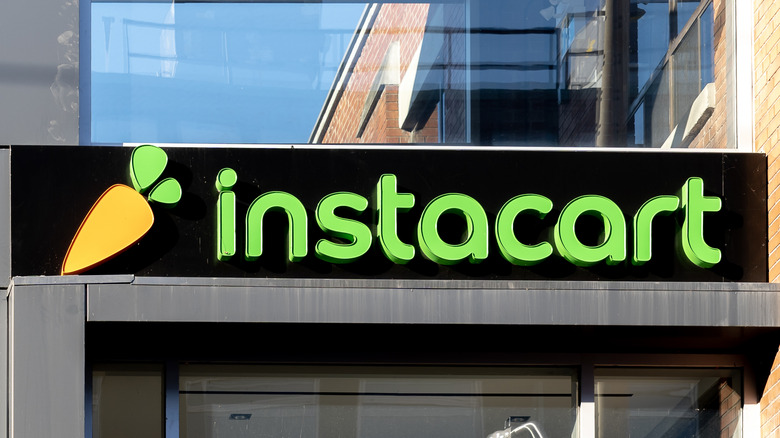12 Aldi Secrets Employees Don't Want You To Know
Aldi is a fun place to shop because of its ever-changing inventory, but there are also secrets employees don't want you to know about shopping there. There are plenty of scandals in Aldi's past that are best kept under wraps. Some Aldi secrets relate to new products, markdowns, and product discontinuations that have the potential to send floods of customers through the doors. Other secrets require a little extra work on the part of employees. While employees are there to work, some tasks can be a little more challenging or annoying than others.
By the time you finish reading this article, you will know how to read the price labels at Aldi like a pro as well as when to come in and how to find the best deals. You'll also know about some of the skeletons Aldi has been hiding in its closet that the employees would rather not share.
Aldi has a storied past that includes a kidnapping and a feud
One Aldi secret employees don't want you to know is that Aldi was born from a feud. Two brothers named Karl and Theo Albrecht took over their parents' German grocery store after returning from World War II. They decided to franchise the store and had 77 locations by 1954. The stores (which eventually became Aldi) were no-nonsense with only bare essential products, no perishable foods, no decorations, and no advertising.
Despite the success they found with their concept, the two brothers fought over whether or not they would sell cigarettes in 1961. Karl was worried people would try to shoplift cigarettes and split off into a cigarette-free store called Aldi Süd. Meanwhile, Theo's cigarette-selling store was called Aldi Nord. As you can guess from the lack of cigarettes for sale in your local Aldi, Karl's Aldi Süd is the store we know in the U.S. Despite their differences, the two stores still worked together. You can still find Aldi Nord in various cities across Europe today. There's definitely a difference between the two Aldis. While they have a similar feel, the two stores have different logos, and they have different products.
In 1971, Theo was kidnapped and held for ransom for 7 million Deutschmarks. After seven days, the kidnapper freed him, and he claimed the ransom money on his taxes, and conspiracy theories circulated. After the kidnapping, both brothers became recluses.
Aldi owns Trader Joe's, but it's part of the founding brothers' rivalry
Trader Joe's and Aldi are also related. However, the Aldi family tree is twisted such that Trader Joe's is actually the adopted stepbrother of the U.S. Aldi. Trader Joe's first opened in Pasadena, California in 1967, so it existed before Karl Albrecht's Aldi Süd crossed the ocean and opened stores in the U.S. in 1976. Aldi Nord didn't follow its sibling chain to the U.S. in the traditional way. Instead, it bought Trader Joe's three years later in 1979 (or at least the Albrecht family trust, which owns Aldi Nord, did).
So Aldi does own Trader Joe's, but it's not the Aldi you know in the U.S. that owns it. Many people who shop at both Aldi and Trader Joe's believe that the same company owns both, but they have different parent companies. Every time you go to Trader Joe's, you're participating in a long-held rivalry. Interestingly enough, even though the initial argument separating the two Aldis was about whether or not to carry cigarettes, you won't find them in Trader Joe's or your local U.S. Aldi. Aldi's employees hope you don't notice that Trader Joe's has far more interesting products than the U.S. Aldi. If you peruse its website, you're also likely to get jealous that the version of Aldi that came to the U.S. was Süd, not Nord. Aldi Nord even offers online deals on products like hot tubs and inflatable boats.
There's a reason people sometimes beat down the doors on Wednesday mornings
Diehard Aldi fans and deal seekers know the Aldi secret that most of the deep discounts show up on Wednesday mornings. Older meat gets a markdown as does Aldi Finds from the previous week. When there are especially good deals or exciting items in the Aldi Finds aisle (aka The Aisle of Shame), it's not uncommon for people to line up at the door before the store even opens. Then there's a Black-Friday-like dash through the doors to retrieve that special item before it's gone. When it comes to the Aldi Finds aisle, there's often a limited stock, so early birds sometimes hoard products. Although some Aldi finds are located elsewhere in the store, like in the frozen food section. Aldi Finds items have white tags with red lettering.
Aldi employees don't want you to know that you're likely to find discounts in the store every Wednesday morning that you won't find online or featured in in-store ads because it would add to the Wednesday morning chaos. When the store closes on Tuesday nights, the sticker prices change. You never know what markdowns you'll find the next morning around the store as employees try to make room for the next week's new products.
There's a hint on the shelf price tags about whether or not you need to stock up
Speaking of hoarding products, Aldi is notorious for having limited-time items people grab in mad frenzies. However, Aldi employees don't necessarily want you to know your favorite product is being discontinued because they know what kind of chaos would ensue. The truth is that there's a trick to knowing if an item is discontinued without having to ask an employee or hearing about it through the grapevine.
A big Aldi secret is that the letter "D" on price labels and stickers stands for "discontinued." You might see this as part of the product coding on the shelf price label or the item's price sticker. It might even be a hand-written letter "D" if the news of the product's discontinuation came down the wire after the labels were printed. So if you ever see a "D" on one of your favorite products, it's fine to stock up.
Beyond discontinued-forever items, you'll also want to take advantage of seasonal items or old Aldi Finds items heading out the door soon. You can quickly browse the shelves for deals by looking for yellow tags with red text, which are the ones that are on sale. These yellow-tagged items are the ones the store is trying to clear out to make room for the next week's shipment. You'll also want to take note of blue-tagged products since those are seasonal and won't be around for long.
Aldi had a horsemeat scandal
One of the biggest scandals that ever hit Aldi was when some of its beef products contained horse meat instead. Aldi wasn't at fault, but the employees certainly don't want you thinking you might find surprise horse meat in your Aldi food. The horsemeat incident happened in 2013 as a result of a kerfuffle with its meat supplier Comigel. DNA results confirmed that some Aldi products that were supposed to be beef were actually 30% to 100% horsemeat. Once Aldi confirmed that some of its Findus beef lasagnas and frozen burgers contained horse meat, it immediately pulled the products off its shelves.
The horsemeat scandal happened along an international supply chain pathway. A French food producer asked its subsidiary in Luxembourg to make beef products and ordered the meat from France. A Cyprus subcontractor sourced the meat, enlisting a trader in the Netherlands who ordered meat from Romania. The Romanians sent horsemeat through the supply chain, swearing that the order had been for horse rather than beef. Then the Aldi products ended up getting made with horse meat. Clear as mud? We thought so.
The bottom line is that Aldi never intentionally sold horsemeat to its customers and wishes you'd forget it ever happened. Of course, we've dredged the incident up a decade later, so the story isn't going away any time soon.
The cheapest bread at Aldi is likely its least fresh
If you're looking for a deal in the bakery aisle and stumble upon bread that seems too cheap to be true, there's an Aldi secret employees don't want you to know about it. If you buy cheap bread, it's not going to last as long as the more expensive bread. Five days before Aldi bread is about to expire, Aldi cuts the original price in half. The older bread will also be closer to the front of the shelf. Of course, if you go through bread quickly or plan to store it in the freezer, it's not a bad deal. But if you value having nice, soft bread that you can eat for a while at a leisurely pace, you're going to want to check the expiration date on any cheap bread you find. If you want the freshest possible bread, you want to come in on Wednesday when the store has been restocked.
There's another trick you need to know: When Aldi employees reduce a product like bread or meat that stays on the shelf on a regular basis, they will add an "Aldi savers" tag or a "prices so low" sticker. You might even see a handwritten discount price if there weren't a whole lot of the items left on the shelf in the first place. In these cases, you'll likely notice an expiration date on the package that's in the immediate future.
You can ask for a price adjustment
Don't tell Aldi employees we told you this, but you may be able to ask for a price discount on some items. Not only can you ask a store manager for a discount in certain cases, but you can also ask for a price adjustment refund if you notice a price markdown on an item you've already purchased. In this case, you can show the cashier your original receipt for having purchased the item at a higher price and ask for a refund of the price difference.
Use your head when asking for a discount or price adjustment. A store manager would be more likely to honor a discount request if you're buying items in bulk or if you've seen an expensive Aldi Finds item not move off the shelf for weeks. However, they're going to say "no" if you ask for a price adjustment refund for something like bread or meat that they've marked down because it's nearing its expiration date. It's more likely that asking for a price adjustment refund would be successful for marked-down sale items like canned or boxed food, refrigerated food, frozen items, or toiletries you regularly see on the shelf.
Another thing you need to know about the price adjustment refund is that it only works within the same store where you first bought the product. Aldi also doesn't price match with other stores like Walmart, so don't bring in another store's ads hoping for a refund.
You can shop online
Don't get an Aldi employee started about their dislike of the online shopping option. Those Instacart orders are the bane of their existence. Aldi employee u/MachupAndKesterd said on Reddit that "It's exhausting because we're timed on how quickly we shop, pack, and bring your order to your car." Since there may only be one employee dealing with every part of the process, it can be especially stressful during busy times.
Another Aldi employee on Reddit, u/balboafan74, says, "Grocery shopping for 9 straight hours, customers inside the store in your way, asking questions while we're trying to do the curbside orders & being timed on them, customers placing huge orders that require 2 carts & take too long to get done." As you can imagine, it's the job that most employees don't want to be assigned to do, especially if the store is busy, there aren't a lot of other employees to help customers on the floor, and they keep getting interrupted during a timed task.
Toiletries aren't as good a deal as some other products
Aldi employees want you to do as much shopping at Aldi as possible. While it's true that many items are cheaper at Aldi than anywhere else in town, it's not true for every product. Aldi's brands may allow you to get out of the store with a cheaper bill than at other grocery stores. However, you'll find fewer good deals on name-brand products and fewer good deals in the toiletry aisle.
We'll give you a few tangible examples. Honey Nut Cheerios costs $1.30 more at Aldi than at Walmart. The price difference can be even more extreme in the toiletry aisle. For example, you'll pay $2.88 more for Head & Shoulders Classic Clean at Aldi than you will at Walmart. Meanwhile, Crest Plus Scope has an even more extreme $3.38 price difference between Aldi and Walmart. So not only should you do a price comparison when grabbing name-brand products, but you may want to skip the toiletry aisle altogether.
Aldi's liberal return policy means you can ask for a refund and replacement simply because you didn't like a product
Aldi's return policy is extremely generous, which can be annoying to employees if you're always bringing things back. However, Aldi's Twice as Nice Guarantee allows you to bring food you don't like back for a refund and a replacement, as long as you bring the packaging and any unconsumed food back to the store.
Of course, sometimes a product will sit in your cupboard or freezer long after you've lost the receipt. If you end up with a vile product and no receipt, Aldi's return policy still allows you to bring back the packaging and uneaten food without a receipt. So, if you bought garlic mashed potato chips around Thanksgiving and later hated them as much as we did, you can bring the uneaten portion of the package back and get a refund. However, if you don't bring your receipt, you can't get a monetary refund – just an Aldi gift card. A big Aldi secret is that this generous return policy allows you to try items you're not quite sure about, like unfamiliar products during German Week. Just bring it back if you don't like it.
Aldi says, "The Twice As Nice Guarantee does not apply to non-food ALDI Finds items, alcohol, national brands and non-quality related issues." Such items only merit a replacement or a refund (not both). And electronics are on a 90-day clock for returns.
You can get cash back for shopping at Aldi with Checkout51
Aldi doesn't accept non-Aldi coupons – not even manufacturer coupons for name-brand items. If you ever get an Aldi coupon, it will be one you find in the store or get in the mail, and these are fairly rare. For example, you might see some when a new Aldi location opens in your city. Otherwise, you're usually stuck paying the prices you find listed on store shelves or packaging stickers. However, one trick employees won't tell you is that you can get cash back if use Checkout51 when shopping at Aldi.
The Checkout51 app provides cash back for certain items on scanned Aldi receipts. The app lists refreshes every Thursday and includes a list specific to Aldi. The cash back amount may be just a few cents, but you may also find items that give you as much as $3 back. There is one caveat: If you compare what's on the Checkout51 Aldi list with what's currently available to buy at Aldi, the products may not necessarily match. Checkout51 lists several products by a brand that Aldi carries, but Aldi may not now or ever carry that particular item. For example, Checkout51 may list several Arm & Hammer brand products, but Aldi may only have A&H laundry detergent (or even no A&H products). So, the list is really hit-and-miss, and you'll want to check Aldi's online product lists before thinking you're going to really make some serious cash.
Your Aldi fish purchases may be subsidizing North Korea's missile program
When you buy one of Aldi's great seafood items, Aldi employees definitely don't want you to know the Aldi secret that you could be subsidizing North Korea's missile program with your purchase. No, Aldi isn't sending money directly to Kim Jong Un. The store wouldn't be as popular as it is if that were the case. However, any of the seafood you buy from Aldi that comes from China (like tilapia or its Sea Queen brand), is suspect in more ways than one. It turns out that Chinese fish processing plants are known for hiring employees from North Korea for what amounts to slave labor. Once the North Korean citizens get their paychecks, they're required to give up to 70% of it back to the North Korean government. And you thought your employment taxes were high!
Workers North Korea sends to other countries bring $200 million to $500 million per year back to the government, which funds a large chunk of North Korea's billion-dollar missile program. The U.S. has a law forbidding importing products into the U.S. from North Korean workers, but it can be difficult to always know what's happening along the supply chain.
